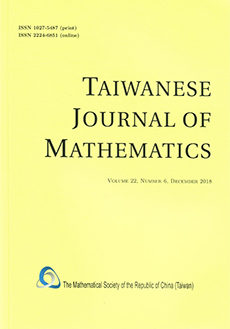Abstract
In this paper, we give a number theoretical application of a simple discrete map. For any prime $p\geq 5$, we show that the numbers in the set $G(1, p-2)=\{1, 2, 3, \cdots , p-2\}$ can be divided into disjoint triplets $\langle a, b, c\rangle $, such that $a\cdot b\cdot c\equiv 1$ (mod $p$). This is a generalization of the well known doublet--division, that is, the numbers in the set $\{1, 2, 3, \cdots , p-1\}$ can be divided into disjoint pairs $\langle a, a^*\rangle $, such that $a\cdot a^*\equiv 1$ (mod $p$). The reason that we can perform the triplet-division is because there exists a simple map $F$ defined on the set $G(1, p-2)$ such that any number $a\in G(1, p-2)$ is a period-3 point of the map. Furthermore, the triplet $\langle a,~F(a),~F^2(a)\rangle $ has the property that $a\cdot F(a)\cdot F^2(a)\equiv 1$ (mod $p$).
Citation
Chyi-Lung Lin. "ON THE TRIPLET-DIVISIONS OF THE SET $\{{ 1,2,3,\cdots ,p-2}\}$." Taiwanese J. Math. 2 (3) 303 - 312, 1998. https://doi.org/10.11650/twjm/1500406970
Information





